#Biblical Counseling
Explore tagged Tumblr posts
Photo



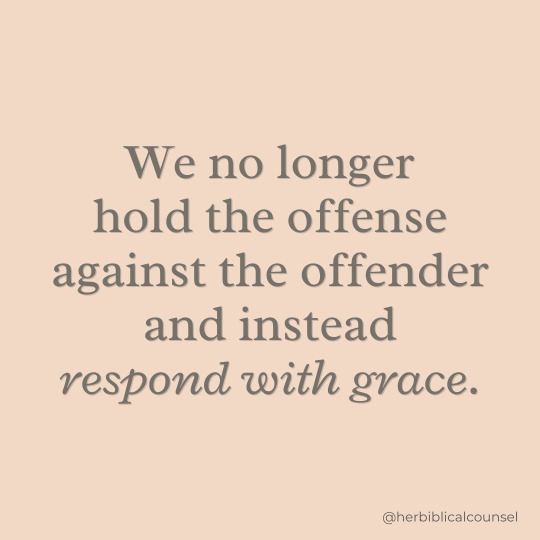
When someone offends us, it is easy to dwell on our hurts and justify an ungodly response of anger or bitterness. However, just as God has forgiven us of our sins through His son Jesus Christ, we are to forgive others. To forgive means to send the offense completely away from our hearts and mind. We no longer dwell on the offense or keep a record of it in our hearts. It also means that we respond to the offender in grace, returning an offense with a blessing, even if the offender does not deserve it. Who do you need to forgive and show grace to today?
#forgiveness#forgive#Love One Another#her biblical counsel#give grace#Biblical Counseling#bible verse#biblical scripture#biblical truth#encouragment#Christianity#Jesus Christ#christian faith#christian quotes#Women in the word#women of faith
16 notes
·
View notes
Text
Bob Jones University will forever be associated with the GRACE Report. That's its legacy.
We have that.
#Bob Jones University#Donn Arms#Nouthetic Counseling#Jay Adams#Biblical Counseling#Abuse#GRACE Report
2 notes
·
View notes
Text
Psychology and Christian Theology
I WANT TO REVISIT a subject I’ve spoken about several times over the years. Can psychology and Christian theology be integrated into a meaningful, powerful, and comprehensive form of counseling. Mark R. McMinn, Ph.D., writes, “The healing motif woven throughout the narrative of human history reflects a common pattern to healing and health.”1 Psychology is one of several disciplines that seek to…

View On WordPress
#Augustine of Hippo#Biblical Counseling#Body#Grace#Grace-Based Counseling#Integration of Psychology and Christian Theology#Mind#Psychology#Spirit#Therapeutic Process
2 notes
·
View notes
Text

Is Christ asking us to hate ourselves?
By Clinical Psychologist & Bible Researcher Eli Kittim 🎓
What is the goal of rebirth?
As a clinical psychologist, I will take a minute to explain the basic differences between our “true self” (that lies buried underneath all the cultural conditioning that we have undergone) and the “persona” or the mask that we wear to perform different tasks throughout our busy day. Carl Jung stressed that if there is no conscious assimilation of unconscious contents, then we will inevitably fail to integrate our lives and achieve wholeness. That’s because those who repress their feelings of guilt and shame, and lock them up inside a dark room within their unconscious, are essentially splitting off their personality into two compartments: the conscious and the unconscious mind. Jung warns that if people don’t get in touch with their unconscious life, but only identify with their persona, they’re bound to suffer psychological turmoil. In biblical terms, some people are so detached from themselves that they’re not even aware that they’re sinners (1 Jn 1:10).
From a scriptural perspective, we’re all sinners, with a propensity for evil. The ego that has been created throughout an individual’s history is part of what the Bible calls the “carnal”(sarkikos) or “fleshly” self (1 Cor. 3.1-3). This is the unregenerate self that is always self-seeking, self-serving, and self-absorbed. And it has all the evil inclinations that the Bible speaks of. This is not the “true self” which is created in the image of God (imago dei). This is the “false self” in the image of Adam, the first sinner. That’s precisely why we need a savior to liberate us from this “false self” system so that we can, once again, become like the pre-fall Adam. The only way to achieve this goal is through a conscious assimilation of unconscious contents, and then, in the process of reliving our past traumas and fears, we will be cured (Phil. 2:12). During this cathartic and therapeutic process, we ask Christ to forgive us and to take our load off our shoulders.
If you do that, an awesome miracle will occur and your whole life will change in an instant: “your grief will turn to joy” (Jn 16:30)! And you will experience moments of intense love: “a good measure, pressed down, shaken together and running over” (Luke 6:38). You will also experience your “true self,” as if Christ himself had become your new identity (Gal. 2:20). And you will, for the first time, love yourself! You will also love others and fall madly in love with Christ. Your gratitude will become your prayer of thanksgiving. So, that’s the born-again experience in a nutshell!
Loving yourself doesn’t go against Christ’s teaching
Having laid the groundwork for understanding the two different types of self, I want to now explain which behaviors, thoughts, and emotions are healthy and appropriate to Christians, and which ones are unhealthy, inappropriate, and unchristian. The attitude of genuinely caring for oneself, accepting oneself (despite one’s shortcomings), and trusting oneself is essential not only for healthy psychological functioning but also for the Christian life. It is conducive to caring for others, accepting others, and trusting others. By contrast, hating oneself is obviously an abnormal state of affairs where one dislikes himself, sabotages himself, hurts himself, and, in some cases, even kills himself. As an illustration, the mass shootings in the US are cases in which the hate one has for one’s self is now extended to others. Bottom line, hating yourself is not a healthy attitude under any circumstances. It can also lead to various disorders (e.g. eating disorders and depression). This self-hate is often unconscious so that we don’t even realize that we dislike ourselves. Because it’s repressed in the unconscious, it’s often projected onto others, and we end up hating people without even knowing why. After all, if we don’t love ourselves at all, and we don’t even know what love is, how can we possibly attempt to love others, let alone God? How can we possibly love others if we hate ourselves? That’s precisely why self-hatred is not healthy at all, and should never be encouraged, whether in our psychological world or in our spiritual world. In fact, loving yourself (in the right way) is actually the goal of Christianity! Christianity is in the business of making lovers, not haters. A pianist practices his piano everyday. A guitarist practices his guitar everyday. A Christian ought to practice *love* everyday. Love is our goal and our most precious treasure in life. If we have love, we don’t need anything else.
1 John 4:8 writes:
He who does not love does not know God;
for God is love.
If it’s ok for God to love us, then why is it wrong for us to love ourselves? When God instructs us not to “love the world or the things in the world” (1 Jn 2:15), that’s a warning against loving our instinctual nature, that is, our desires, lusts, and passions, what Freud called the “id.” But loving the “carnal self” and loving the “genuine self” are two completely different things. We all need to be loved, to be cared for, to feel protected, and to feel worthy, rather than unworthy, unlovable, and unimportant. That’s precisely what God does during the regeneration process. He showers us with love and makes us feel special, worthy, important, and treats us like kings and queens. If you haven’t felt like that, you haven’t been reborn. Love is our currency, our lifeblood! 1 John 3:14 declares:
He who does not love abides in death.
1 John 4:16 summarizes Christian Theology thusly:
God is love, and he who abides in love
abides in God, and God abides in him.
Even the Old Testament urges us to “love the sojourner” (Deut. 10:19) and to “love the LORD your God” (Deut. 11:1). Romans 13:10 sums up love as the fulfillment of the law:
Love does no wrong to a neighbor; therefore
love is the fulfilling of the law.
Love is the greatest commandment (Matt. 22:36-40)! That’s precisely why “knowledge puffs up, but love builds up” (1 Cor. 8:1). Therefore, there’s a big difference between “selfish love” and “genuine love” (2 Cor. 6:6; 8:8). God only looks at our heart because that’s where love comes from. Galatians 5:14 commands people to “love your neighbor as yourself." But how can you love your neighbor if you hate yourself? Paul doesn’t say “hate your neighbor as yourself.” Rather, he explains that love is the fruit of the Spirit (Gal. 5:22):
But the fruit of the Spirit is love, joy, peace,
patience, kindness, goodness, faithfulness.
Thus, Paul urges us to cultivate love, to prune and water it daily so that it might grow. In Phil. 1:9, he writes:
it is my prayer that your love may abound
more and more, with knowledge and all
discernment.
Later, in Phil. 2:2, he exhorts his followers to stir up the gift that is in them:
complete my joy by being of the same mind,
having the same love.
In 1 Tim. 1:5, Paul reminds us that our mission is to awaken love from the bottom of our hearts:
the aim of our charge is love that
issues from a pure heart and a good
conscience and sincere faith.
Is Christ asking us to hate ourselves?
Many people misunderstand the Bible. When Christ uses hyperbole and says “If anyone comes to me and does not hate father and mother, … such a person cannot be my disciple” (Lk 14:26), he doesn’t mean that we should hate our parents. He means that we should love them less than Christ (which is the 1st commandment)! The same goes for the “self.” We must love ourselves less than Christ. And we must also seek to transform and transcend our “carnal self” that is selfish, greedy, lustful, angry, envious, etc. Jesus is not saying that it’s good to hate the inner you, or to hate who you truly are. In fact, loving yourself (i.e. forgiving yourself and accepting yourself) is a prerequisite condition for loving others. How can you possibly love others if you hate yourself? Luke 9:23 is teaching us how to prepare the soil of our heart for the harvest of love. Just as when we avoid consuming unhealthy foods, we should also avoid certain unhealthy or toxic behavioral patterns. Jesus is not teaching you to hate yourself or to be suicidal. He is not saying that loving yourself is a heresy. On the contrary, Jesus teaches that we should stop feeding the “false self” who loves the things of the world, namely, lust, money, sex, power, competition, greed, envy, etc. And although it may sound counterintuitive, we actually gain control over our addictions through genuine self-love (2 Tim. 1:7):
God did not give us a spirit of timidity but a
spirit of power and love and self-control.
In Luke 14:25-27, Jesus is not preaching hate. He’s not saying “Hate your neighbors as yourself.” Or “Hate your family and yourself.” No. It’s not a hate-speech. The point he is trying to make is that we must make Christ our first priority. He must take first place in our life. In other words, he must be our greatest love, and we must love him more than our family and friends, and even more than life itself. So what he’s actually saying is that he who loves me less than family and friends cannot be my disciple because he loves others more than me (idols). That’s the point. Jesus is not preaching hate.
In John 12:25, Jesus is saying the exact same thing. He who loves his self more than Christ will eventually lose it. Conversely, he who loves his life less than Christ will find it (i.e. he will find his “true self” and life-eternal). Jesus doesn’t imply that you should hate yourself, your family and children. Jesus is not psychotic.
In 2 Timothy 3:1-5, Paul uses the term φίλαυτος (philautos), which means “selfish” or “self-loving” (i.e. narcissistic), and then lists all the traits associated with this selfish love (vv. 2-4):
lovers of self, lovers of money, boastful,
arrogant, slanderers, disobedient to
parents, ungrateful, unholy, unloving,
irreconcilable, malicious gossips, without
self-control, brutal, haters of good,
treacherous, reckless, conceited, lovers of
pleasure, rather than lovers of God.
Notice that all these characteristics refer to some character flaw that is based on selfish desires or pleasures. This is not the same as loving your “true-self” humbly and genuinely. Loving who you really are in Christ is actually necessary for spiritual growth. It is the purpose of our very existence and the goal of all our struggles. To be transformed into Christ means being transformed into love. In fact, during rebirth, a great love starts to flow within us, and we begin to love ourselves as we really are. We also fall madly in love with Jesus. So no one should be preaching hate. Christianity is all about love.
“Lovers of self” refers to those people for whom everything revolves around them, thereby showing a callous disregard for others. By contrast, loving yourself in a genuine, pure, and humble way, accepting and forgiving yourself for past mistakes, is actually a very healthy and godly endeavor. Loving who you really are is not the same as being selfish, nor does it mean that you love yourself more than God.
James 3:13-16 talks of jealousy and selfish ambition, not of forgiving and accepting *yourself* in Christ’s love. For example, James 3:14-15 uses the word ἐριθεία (eritheia), which means seeking rivalries, disputes, having ambition, etc. It could be construed as a form of self-seeking but it is not, strictly speaking, talking about the self. It is this type of quarreling that is demonic, not a genuine love for yourself. In other words, whenever these feuds arise, there is anarchy and evil. James 3:14-15 writes:
if you have bitter jealousy and selfish
ambition in your heart, do not be arrogant
and so lie against the truth. This wisdom is
not that which comes down from above, but
is earthly, natural, demonic.
Conversely, loving yourself in a genuine way is not demonic, but actually the goal of Christianity!
Conclusion
Love is our goal, our aim, and our modus operandi! Instead of practicing the commandments, which are just rigid behavioral patterns, we should be cultivating love in our hearts. Paul writes in 1 Cor. 13:1-5:
If I speak in the tongues of men and of
angels, but have not love, I am a noisy gong
or a clanging cymbal. And if I have
prophetic powers, and understand all
mysteries and all knowledge, and if I have
all faith, so as to remove mountains, but
have not love, I am nothing. If I give away all
I have, and if I deliver my body to be burned,
but have not love, I gain nothing. Love is
patient and kind; love is not jealous or
boastful; it is not arrogant or rude. Love
does not insist on its own way; it is not
irritable or resentful.
Elsewhere, he says (1 Cor. 13:13):
So faith, hope, love abide, these three; but
the greatest of these is love.
1 Cor. 14:1 doesn’t say “make hate your aim.” Rather, it says “Make love your aim.” In Col. 3:14, Paul equates our new identity with love, and urges us to fully immerse ourselves in it:
And above all these put on love, which
binds everything together in perfect
harmony.
We are to seek love in every situation, at every moment! Loving ourselves is the prerequisite for loving others. Love is our goal, not our enemy. The goal is to love ourselves in Christ. Meaning that when we receive Christ’s new identity, we begin to love ourselves for the very first time, and we also stop hating ourselves for the very first time. Christ’s love is genuine and pure. It’s part of the fruit of the spirit. This love we must pursue. This is who we are in the image of God. For how can we possibly love others if we hate ourselves?
#self love#loveyourself#true self#false self#ελικιτίμ#born again#ego#id#narcissism#selfhate#self esteem#therapy#the little book of revelation#self worth#biblical counseling#selfish#regeneration#Elikittim#psychology#biblestudy#love#το μικρό βιβλίο της αποκάλυψης#pastoral#Jesussayings#homiletics#hatefatherandmother#topicalpreaching#self acceptance#fruit of the spirit#forgiveness
1 note
·
View note
Text
Sonrise Annual Discipleship and Biblical Counseling Training Conference 2025
Do you desire to help people? Do you find people like to talk with you and get advice? Do people ever call you a good listener? Are there opportunities for you to better minister the Word of God in personal ministry through conversational ministry or service? If this is true for you, then consider joining us this January, February, and March for our annual Biblical Training Conference. With 30…
#Biblical Counseling#Counseling#Counseling Training#Personal Ministry#Sonrise Biblical Counseling Ministry
0 notes
Text

Please enjoy our latest FREE BOOK—The Cyber Effect, if you'd like to dig a bit deeper into the cultural contagion that has incarcerated the hearts of too many parents: https://lifeovercoffee.com/store/
#socialmedia#internet#cybereffect#biblical counseling#rickthomas#relationships#marriage#family#parenting
0 notes
Text
THE NATHAN MODEL FOR BIBLICAL COUNSELING: PRINCIPLES FROM 2 SAMUEL 12:1- 24
By Lawrence Mpeta
Introduction
Sometimes, Christian counselors struggle to determine a suitable approach when confronting people of high esteem in their societies.[1] When leaders or elites fall into sin, it is challenging to drive them toward realization, confession, and restoration because one may be afraid of disgracing or annoying them during counseling. Prophet Nathan had a similar challenge when King David sinned against the LORD (2 Samuel 12:1- 24). However, God empowered Nathan with wisdom to lead David toward restoration, and he counseled David without humiliating or infuriating him. Nathan’s approach made David acknowledge that he had transgressed against the LORD and needed God’s forgiveness. Therefore, Nathan’s model provides a framework and invaluable principles for approaching, confronting, and restoring people of high esteem in every society.
Read more by following the link below
0 notes
Link
The College of Biblical Studies is located in Houston, Texas. Leveraging its academic rigor and biblical worldview training, CBS offers a nationally and regionally accredited college education on campus and online, with several programs offered in the Spanish language.

Students receive transformational education and training for service to families, ministries, businesses, and communities around the world. CBS has provided biblically based education to more than 26,000 students since 1976, and is ranked as one of the lowest tuitions in Texas.

#theology#leadership#counseling#christian education#biblical counseling#bible study#bible college#k12 academics
0 notes
Text
We had Nana’s burial today and I truly don’t know how I feel about it. Aside from numb and still disbelief💔
Even though I know she’s in heaven and I’ll see her again, it doesn’t take any of the pain of losing her away
#I miss her so much#sometimes I feel like she’s just away somewhere but then it hits me…#and bad days/weeks trigger it#I miss her long texts and her laugh and her good solid biblical advice and counsel 💔#personal
10 notes
·
View notes
Note
1, 11, 36, 38 for ask game?
what are 3 things you’d say shaped you into who you are?
My parents, Wretched radio, and the internet
11. what do you consider to be romance?
A natural product and outworking of purposeful, unconditional love. When a husband and wife are faithful and sacrificial toward each other, it makes them treasure each other and want to win them.
36. are you an open book or do you have walls up
I don't intentionally put walls I up. I tend to be pretty open after we have spent some time together. Getting over that first hurdle of getting to know someone can be pretty hard though.
38. fave song at the moment?
The Graduate by Arcadian Wild
youtube
Thanks!
3 notes
·
View notes
Link
by Paul Tautges | Bitterness is a prison. It is self-destructive; it is spiritual suicide. That’s why it’s often been said, “The bitter person drinks a vial of poison and waits for their enemy to die.” Therefore, when counseling the bitter person, the warning of Jesus should not be neglected. Use it to direct the eyes of the bitter...
#Biblical Counseling Coalition#Paul Tautges#Counsel the Bitter Person with a Warning from Jesus#biblicalcounselingcoalition.org
13 notes
·
View notes
Photo

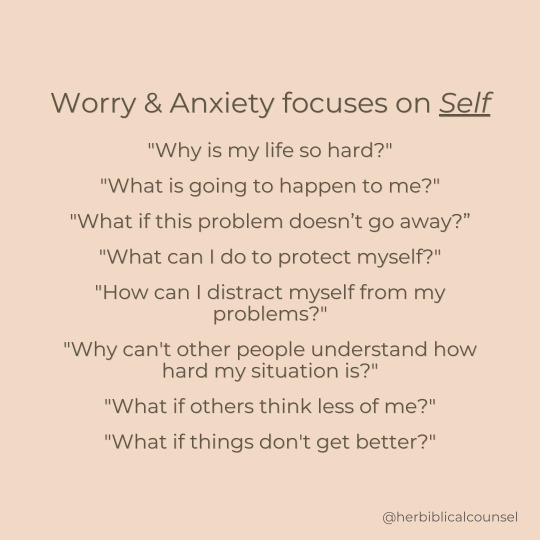

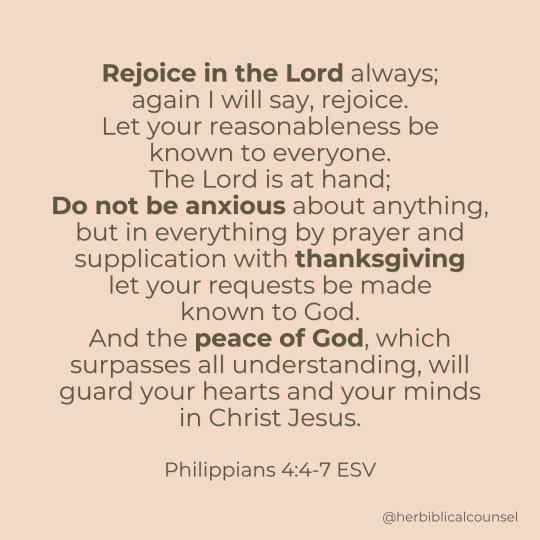
Worry and anxiety are unbelief. They focuses on trusting in self, rather than trusting the sovereignty of God. Worry and anxiety dwell on what God teaches us not to dwell on [Phil 4:8]. They lead to complaining and grumbling, which God hates [Phil 2:14]. Worry and anxiety encourage us to take control over our own situations instead of trusting God, fooling us to think that we are wiser than God. The opposite of worry and anxiety is to trust God. Trusting God shifts our attention from self to God’s love, wisdom, and power. We recognize that God is in control and that He is worthy to be trusted during our trials. Trusting God gives us the strength to love and serve others, even when things are challenging for ourselves. 🙏 If you are worried or anxious today, repent and pray to God with thanksgiving, making your requests known to Him, and He will guard your heart and mind with His peace [Phil 4:4-7].
#worry#dont worry#worryfree#anxiety#anxiety relief#her biblical counsel#hbc#bible verse#Biblical Counseling#Bible#biblical truth#biblical scripture#women of faith#Women in the word#psychology#Christianity#christian quotes#christian faith
2 notes
·
View notes
Text

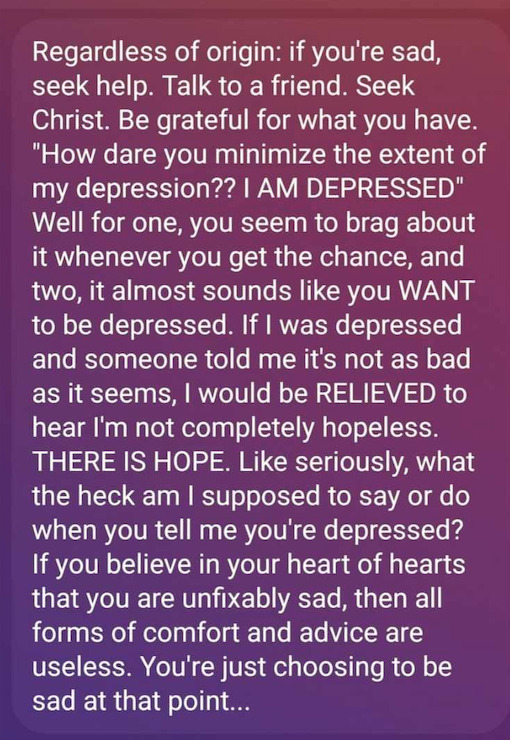
Trigger Warning: For Cruel Ignorance about Depression
BobStool -- a BJU-student-run instagram -- received and amplified this statement from another BJU student. Clearly this is a male who has never had a problem in his life. The ignorance is so loud.
I swear, most people use their "depression" as a way to sip others' pity and feel special. I'm tired of hearing about this "chemical imbalance" as if there's a "normal" amount of serotonin/dopamine. It's different for each person; and when a drug (like selective re-uptake inhibitors) tries to interfere, the body seeks to balance itself AGAINST the drug. Once the drug wears off, normal life feels even worse than before, increasing dependence on the drug. The body seeks normalcy on its own. This is why the "dopamine detox" trend became a thing, to give the body time to readjust to what it deems as NORMAL. And somehow, millions of Americans are told that there is something inherently wrong with them in order to make money off of sadness. If you think your sadness makes you unique/set apart/special, 1 got news for you: SADNESS IS NORMAL, you're not "more sad" than most people. It's an insult to those who have a legitimate reason to be sad. Regardless of origin: if you're sad, seek help. Talk to a friend. Seek Christ. Be grateful for what you have. "How dare you minimize the extent of my depression?? I AM DEPRESSED" Well for one, you seem to brag about it whenever you get the chance, and two, it almost sounds like you WANT to be depressed. If I was depressed and someone told me it's not as bad as it seems, I would be RELIEVED to hear I'm not completely hopeless. THERE IS HOPE. Like seriously, what the heck am I supposed to say or do when you tell me you're depressed? If you believe in your heart of hearts that you are unfixably sad, then all forms of comfort and advice are useless. You're just choosing to be sad at that point…
Notice how he's repeating the fundamentalist idea that we are all just a will. There's no body, no mind ... nothing else. We are just a will that chooses either 1 or 0. Jay Adams' ideology is the same.
What else do you see in this dangerous ignorance?
This is Bob Jones University.
2 notes
·
View notes
Text
Proverbs Daily Reflection – January 8, 2025
Bless the hearer and the doer of the Word! #josephmekaelpageministries
Reflection on Proverbs 8: Wisdom Is Greater Than Wealth Proverbs 8:11 (KJV) “For wisdom is better than rubies; and all the things that may be desired are not to be compared to it.” I have experienced seasons of abundance. I held jewels, gold, and money. I’ve also walked through times of loss, where I owned nothing and held on to little. Yet, through it all, God has taken care of me. Wisdom…
#African descent#Bible#biblical illustration#Biblical Teachings#Blog#dailyprompt#divine light#eternal treasures#eternal value#faith#God#godly counsel#godly wisdom#heavenly guidance#humility#Jesus#Joseph#Joseph mekael page ministries#material possessions#Mekael#Page#Proverbs 8:11#Proverbs Daily#Proverbs Daily by Joseph Page#Proverbs reflection#Proverbs wisdom#righteousness#scripture inspiration#Spiritual Growth#spiritual insight
1 note
·
View note
Text
Apostolic Authority and the Role of Prophets: A Scriptural Perspective on the Restored Gospel
The Restored Gospel is centered on God’s unwavering love and His desire to guide His children. From ancient times to today, prophets have been essential in delivering that divine guidance. Apostolic authority, deeply rooted in scripture, serves as a bridge connecting humanity to God’s will. This blog explores how prophetic teachings and sacred texts illuminate the restored truths we hold dear…
#Apostolic traditions and teachings#Biblical evidence for modern-day prophets#Biblical precedents of prophets#Christian faith and modern revelation#Comparing Old Testament and modern prophets#Divine communication through prophets#Doctrine and Covenants and modern revelation#Doctrine and Covenants explained#Doctrine and Covenants Section 1#Examples of prophetic callings in the Old Testament#Faith in modern-day revelation#First Century Apostolic teachings#God’s voice through prophets#Hebrew chiasmus in scripture#How Doctrine and Covenants 1 follows Hebrew chiasmus#How God calls prophets#How God speaks through His servants today#Importance of listening to prophetic counsel#Importance of repentance in the gospel#Joseph Smith Revelations#Living prophets today#Modern-day prophets in Christianity#Old Testament prophets and revelations#Preparation for calamities through prophetic guidance#Prophetic authority in the last days#Prophetic messages and calamities#Prophetic voices in Christianity today#Restored Gospel teachings#Restoring Apostolic traditions in faith#Role of Joseph Smith in the Restoration of the Gospel
0 notes
Text
Sonrise Annual Discipleship and Biblical Counseling Training Conference 2024
Do you desire to help people? Do you find people like to talk with you and get advice? Do people ever call you a good listener? Are there opportunities for you to better minister the Word of God in personal ministry through conversational ministry or service? If this is true for you, then consider joining us this January, February, and March for our annual Biblical Training Conference. With 30…
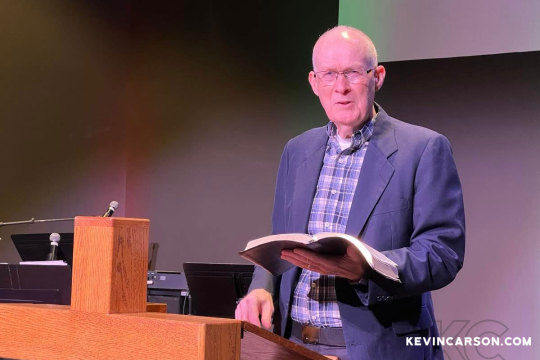
View On WordPress
#Biblical Counseling#Counseling#Counseling Training#Personal Ministry#Sonrise Biblical Counseling Ministry
0 notes